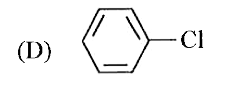Define resonance effect.
The resonance is a chemical phenomenon which is observed in certain organic compounds prossessing double bonds at a suitable position . Certain organic compounds can be represented by more than one structure and they differ only in the position of bonding and Iron pair of electrons. Such structures are called resonance structures (canonical structures) and this phonomenon is called resonance . This phenomenon is also called mesomerism or mesomeric effect.
Topper's Solved these Questions
- SURA'S. MODEL QUESTION PAPER-3BOOK - SURA PUBLICATIONCHAPTER - SURA'S. MODEL QUESTION PAPER-3EXERCISE - PART-C
8 Videos
- SURA'S. MODEL QUESTION PAPER-3BOOK - SURA PUBLICATIONCHAPTER - SURA'S. MODEL QUESTION PAPER-3EXERCISE - PART-D
21 Videos
- SURA'S. MODEL QUESTION PAPER-3BOOK - SURA PUBLICATIONCHAPTER - SURA'S. MODEL QUESTION PAPER-3EXERCISE - PART-D
21 Videos
- SOLUTIONS BOOK - SURA PUBLICATIONCHAPTER - SOLUTIONS EXERCISE - NUMERICAL PROBLEMS
24 Videos
- SURAS MODEL QUSETION PAPER - I BOOK - SURA PUBLICATIONCHAPTER - SURAS MODEL QUSETION PAPER - I EXERCISE - PART - D
23 Videos
Similar Questions
Knowledge Check
In which of the following molecules or ions the resonance effect is NOT Present
A B
B C
C D
D
Which of the following group shows positive resonance effect ?
A−COOHB−CHOC−NH2D−CNThe resonance effect is defined as 'the polarity produced in the molecule by the interaction of two π-bonds or between a π-bond and lone pair of electrons present on an adjacentatom.' The effect is transmitted through the chain.
In positive resonance effect, the transfer of electrons is away from an atom or substituent group attached to the conjugated system. This electron displacement makes certain positions in the molecule of high electron densities. In negative resonance effect, the transfer of electrons is towards the atom or substituent group attached to the conjugated system.
Which of the following does not show resonance effect ?AButa-1, 3-dieneBAcrylonitrileCNitrobenzeneDIsopropylisothiocyanate
Give three points of difference between inductive effect and resonance effect.
View SolutionDefine resonance and resonance energy. What are the conditions for resonance?
View Solution(GOC) : inductive effect(+I and applications),2) resonance effect (comparison OF stabilities)
View SolutionDefine resonance. Draw resonating structures of CO2.
View SolutionThe resonance effect is defined as 'the polarity produced in the molecule by the interaction of two π-bonds or between a π-bond and lone pair of electrons present on an adjacentatom.' The effect is transmitted through the chain.
In positive resonance effect, the transfer of electrons is away from an atom or substituent group attached to the conjugated system. This electron displacement makes certain positions in the molecule of high electron densities. In negative resonance effect, the transfer of electrons is towards the atom or substituent group attached to the conjugated system.
Which of the following does not show resonance effect ?
View Solution
